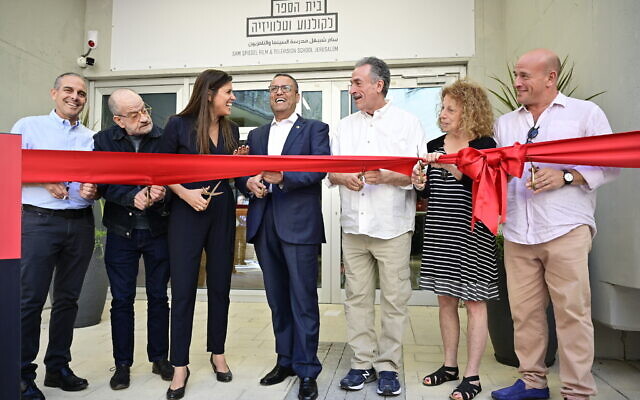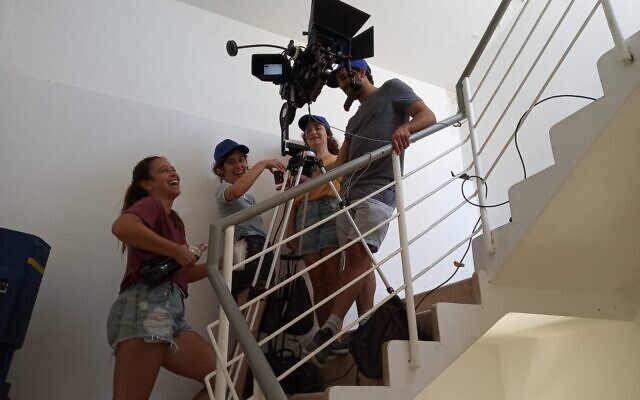The Netflix show “Shtisel” and award-winning films “Zero Motivation” and “Cinema Sabaya” have at least one thing in common: their creators learned their craft in a dingy industrial building in Jerusalem’s Talpiot neighborhood, home to the Sam Spiegel Film and Television School.
Now the film school, recognized as one of the best outside of the US, has moved into new digs in downtown Jerusalem, with three screening rooms, sound stages, editing suites, a film and television library and a student lounge overlooking the red-tiled rooftops of neighborhood buildings.
“It’s drastic,” said Adam Spiegel, the London stage producer and son of Academy Award-winning film producer Sam Spiegel, for whom the school was renamed seven years after it was founded. “It’s gone from punk rock to establishment, but I think it’s terrific. I think it will not lose its sensitivity, but it’s an amazing place, the heart of Jerusalem.”
Sam Spiegel is one of four performing arts schools that are now located on a 2.5 acre arts campus in the middle of Bezalel Street, together with the Center for Middle Eastern Classical Music, the Nissan Nativ Acting Studio, and the School of Visual Theatre, all of which were previously spread throughout the city.
The campus also incorporates the adjacent Gerard Behar Center, home to local dance companies Vertigo and Katamon.
Get The Times of Israel's Daily Edition by email and never miss our top stories
“Jerusalem is a city full of locations and history and conflicts and inspiration,” said Sam Spiegel executive director Dana Blankstein Cohen. “With this new campus, you’re in the belly button of the city.”

The design for the $50 million Sam Spiegel building, part of the Jerusalem Arts Campus in downtown Jerusalem (Courtesy)
The Jerusalem Campus for the Arts was the brainchild of former Jerusalem mayor and current MK Nir Barkat, who placed an emphasis on energizing the city center and shedding the city’s stuffy reputation, with the goal of attracting students and encouraging young families to stick around. During his tenure, the Bezalel Academy of Arts and Design began construction on a new city-center campus and the downtown Hadassah College campus underwent a major renovation.
Barkat “really wanted to change the energy and diversity of the city in a fundamental way,” said Eric Goldstein, CEO of UJA-Federation of New York, which became a major partner in the project. “We were very attracted to that idea.”
Work on the $50 million campus, designed by Efrat-Kowalsky Architects, began in 2017. The project was funded by the city and a number of donors, led by the family of billionaire Natie Kirsh, who controls the Jetro Holdings food supply business in Queens, New York.
It wasn’t all that difficult to fundraise capital for the project, said Goldstein. The Kirsh family has a long history of investing in Israel and liked the idea of a cultural anchor in the city, with the concurrent ability to transform an urban neighborhood.
“We kept framing this as a campus that would become for Jerusalem what Lincoln Center [for the Performing Arts] and Juilliard [School] did for the Upper West Side,” said Goldstein, referring to the two major cultural institutions that opened and merged into one New York City campus in the 1960s.

President of the Sam Spiegel board Asaf Witman (far left), founding executive director Renen Schorr, executive director Dana Blankstein Cohen, Jerusalem mayor Moshe Lion (center), members of the Spiegel family, Adam Spiegel (far right). (Courtesy)
Other major donors included the Paulson Family Foundation, Amy A.B. and Robert I. Bressman, Robert R. and Sherry H. Wiener, and the Iranian American Jewish Federation of New York.
Goldstein and his team worked closely with the office of Mayor Moshe Lion after Barkat left office in 2018, but the departure of one of the project’s biggest boosters still made an impact.
Barkat wanted to have student dormitories built nearby, in order to further strengthen the city center, said Adir Schwarz, chairman of Jerusalem political party Hitorerut, which was deeply involved in the campus project.
“It makes much more sense to have students living right there,” said Schwartz, “like New York University in [Greenwich] Village, where students bring an energy to the area. It would be a win-win.”
In 2021, the city canned the dormitory plan, instead saying it would offer the residences as long-term rentals, likely attracting young religious couples rather than students enrolled at the arts campus.
“When you build dormitories, you know who will live there,” said Schwarz. “Anyone can live in these long-term rentals, but they’re not good for students. They’re good for young couples of all kinds, and they can be religious or secular, but a small, 35-meter apartment doesn’t work for students.”
Room to grow
The strategy for life in the new Sam Spiegel building is to widen and deepen the school’s activities, both for its students and the city’s residents, said Blankstein Cohen.
“We don’t want to inflate the school too much, because the school’s magic is in its very personal approach,” she said. “We know everyone one of the students, their families, their stories. The success of the school is in that intimacy and we don’t want to change that.”
Sam Spiegel currently has 180 students, and it will grow, just not too much, said Blankstein Cohen.
“We want to grow but without losing our DNA,” she added.

View of the former Sam Spiegel Film School building in the industrial area of Talpiot, Jerusalem. November 25, 2018. (Hadas Parush/Flash90)
The film school is in the second year of a new preparatory program for Arabic-speaking students from East Jerusalem who first spend time learning Hebrew and the foundations of television and film. With the new building, there is room for these students to enter the school’s regular two- or four-year program.
There’s also the Netflix Series Lab incubator and a pilot for continuing education students who want to learn screenwriting at Sam Spiegel, something that Blankstein Cohen wants to expand upon, perhaps with another branch of the school.
The screening rooms — the largest one seats 120 — will be used as classrooms during the day and will be open for public screenings in the evening, run by the students themselves. Blankstein Cohen views it as part of a larger ecosystem, with profits going to grants for students.

Students at the Jerusalem Sam Spiegel Film School (Courtesy)
“It allows the city’s residents to come in here and see this gift that was given to the school from the city,” she said.
In addition to being in the center of the city, the new location is intended to foster collaboration, as it is alongside other arts schools, and plans are being made for joint ventures between the schools.
“It’s the geography of it, finding yourself in the center of the city is different and being surrounded by student of other disciplines is a huge resource for everybody,” said Spiegel, who attended the recent grand opening. “Film is a modern and technical discipline, so having these new facilities at their fingertips can only be a boon.”
His father, said Spiegel, would have been “hugely impressed and proud.”

The Talpiot alley named for producer Sam Spiegel, for whom the film school was named and the location of the school’s original home (Courtesy Yossi Zwecker)
The Austro-Hungarian born Sam Spiegel made his way to the US in the late 1930s, and during his decades of work, produced three films that won Best Picture Oscars: “On the Waterfront,” “The Bridge on the River Kwai” and “Lawrence of Arabia.”
His art collection was donated to the Israel Museum after he died in 1985 and the film school was renamed for him in 1996, with a first, initial bequest from the Sam Spiegel Estate.
In 2005, the lane in Talpiot where the school was formerly located was named Sam Spiegel Alley. A description on the street sign calls Spiegel a “Pioneer, Jewish-American Film Producer and Oscar-winner, Lover of Zion.”
“My father would have been hugely impressed and proud,” said Spiegel. “His first thought would have been, ‘Oh my God, my name is on a film school in Jerusalem,’ but he wouldn’t have failed to be energized by the kind of vitality of it — so I think he’d be immensely proud.”


